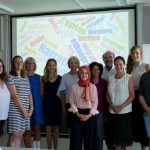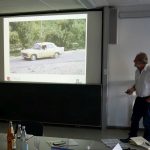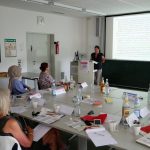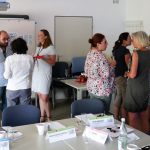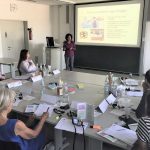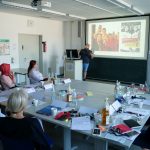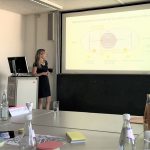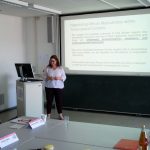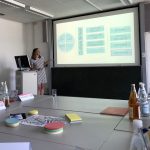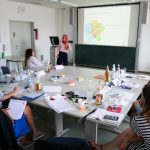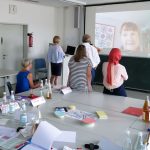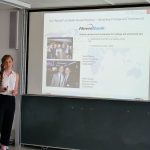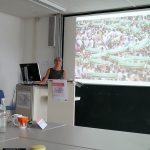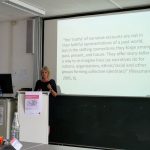ZIS · Center for Intercultural Studies, JGU Mainz
Thursday, July 26, 2018, through Saturday, July 28, 2018
DEUTSCH
In July 2018, the International Workshop "Exploring Migrant Narratives" of the Center for Intercultural Studies (ZIS) took place at the Johannes Gutenberg University Mainz. The workshop was initiated by Prof. Dr. Anton Escher and Prof. Dr. Brigitte Bönisch-Brednich to reflect classic and innovative methodological approaches and different methods of evaluating migrant narratives with a small group of scientists. The discussions also addressed challenges in data acquisition, interpretation and the reproduction of narratives.
As a follow up-event of the workshop "Migrant Narratives - Moving Stories" in 2017, scientists from different disciplines from New Zealand, England, Sweden, Austria and Germany came together. The aim of the workshop series is to develop a framework for a book project on "Migrant Narratives", in which different narratives and analytical tools are presented. They should provide students and scientists information for the evaluation, categorization and interpretation of their own data as well as suggestions to critically reflect on their role as researcher.

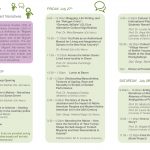
The participants presented selected narratives of migrants, which they collected in the context of empirical research projects as well as through everyday situations. Before individual text passages were discussed as examples, they explained the respective historical and social context of the chosen narratives.
Narratives of and about the Syrian taxi driver Abu Khalil from Maalula were retold by Prof. Dr. Anton Escher (Geography, JGU Mainz), who drove through Syria with him for numerous research projects. Like many others from the Aramaic village of Maalula, Abu Khalil was forced to work in Damascus, Beirut and Saudi Arabia for economic reasons. Through visits and remittances, however, he always maintained the relationship with remaining family members and residents of his village of origin. His narratives give an insight into the transnational way of life and the different social constraints, expectations and needs of personal fulfilment.
Prof. Dr. Silke Meyer (European Ethnology, University of Innsbruck) analyzed how the Austrian police deals with the issue of diversity. Given the controversy that modern police should represent society on the one hand and that police culture relies on idea of unity and comradery on the other hand, the institution of the police is particularly challenged to respect and appreciate differences and diversity. Some policemen with a migrant background tell their life-story in the media as successful assimilation and thereby become "Model Officers". In addition, critical statements made by others who are only partially able to contribute their cultural capital show that "diversity" is not yet valued by the Austrian police as transnational capital.
Prof. Dr. Mita Banerjee (American Studies, JGU Mainz) and Dr. Ahmad Izzo (JGU Mainz) dealt with narratives of Syrian vloggers from different perspectives. Prof. Dr. Mita Banerjee interpreted the video blog GermanLifeStyle (GLS) as a form of life writing at the intersection of migration and the so-called “refugee crisis” in Germany. The video-blog provides a manual to Syrian refugees of how to act in accordance with German cultural traditions and vice versa it advises a German mainstream how to read Syrian cultural signification. In addition, it appeals to the right-wing German party AfD (Alternative for Germany) to spread alternative narratives.
Dr. Ahmad Izzo interprets those YouTube channels as audiovisual guides for Syrians newly arrived in Germany. He analyzed the self-produced content of selected Syrian vloggers, which revolve around experiences, difficulties and problems of Syrians in Germany. Thereby, he focused on the role of the so-called "old Syrians" who came to Germany before the so-called "refugee crisis". The study of digital communication is one of the key issue of the new DFG-project on communities of Syrians in Germany, headed by Prof. Dr. Anton Escher with the assistance of Dr. Ahmad Izzo and Dipl.-Geogr. Marie Karner.
Prof. Dr. Veronika Cummings (Geography, JGU Mainz) gave an insight into photographic methods for studying the lived trans-locality of Sri Lankans who migrated to the Gulf States. Among other things, the visual narratives provide an insight into practices of home-makings and the creation of interspaces. Her analysis also shows that photos are used by migrants to tell success stories and to gain social recognition. During home visits, the migrant habitus reflects a change from "shame to fame", which is an expression of mobility and translocation as capital in line with Bourdieu.
Prof. Dr. Anastasia Christou (Geography, Middlesex University London) deconstructed narratives of male migrants to examine masculinities in relation to issues of ageing, race and sexuality. The stories offer emotional, experiential, storied, life accounts of longing, belonging, family and kinship, identity, power relations and respectability. She revealed ruptures and traumas that challenge, re/affirm, re/configure and dis/locate masculinities.
Thanks to a multi-perspective methodological approach, which includes archival work, interviews with experts and descendants as well as visits to important places, Dipl.-Geogr. Helena Rapp (Geography, JGU Mainz) revealed the impact of a Swedish-born artist and art professor (1882-1966), who moved with his family to the United States in 1890, on Native American art. She discussed the extent to which the European-cosmopolite artistic narrative of Jacobson shaped and created an idea and vision of Native American art and outlined the ways in which his actions generated and elucidated an alter-narrative about Native American Peoples and tribes in general.
Fatma Haron, MA (European Ethnology, University of Innsbruck) referred to comments by Austrian Turks on their consumption of "gummy bears". The example clearly showed, that controversial convictions are often not articulated openly, but expressed in a symbolic way. Such analyzes can shed light on how the political change in Turkey and the discourse of a rising Islamic political identity is perceived in the Turkish diaspora communities in Austria.
In view of the question whether foreign internships within Bachelor's degree programs inevitably promote cultural competence, Prof. Dr. Louise Ackers (Social Policy, University of Salford Manchester) analyzed narratives of British students who had travelled to Uganda for a one month period to gain practical experience in the health sector. As a result, she showed that trainees reduce culture to ethnic differences while hiding organizational or economic differences. This legitimizes racist stereotypes rather than deconstructing them. The lecture was presented by Prof. Dr. Brigitte Bönisch-Brednich and discussed via Skype with Prof. Dr. Louise Ackers. It is based on a joint research project with Prof. Dr. Anya Ahmed, James Ackers-Johnson, MBA and Natalie Tate, MSc.
Dipl.-Geogr. Marie Karner (Geography, JGU Mainz) presented an example of how "community leaders" of Lebanese diasporic village communities are being heroized and thus become role models for younger generations. With the help of print and online media, stories about the life and the origin of "Sheikh Youssef Stephan", a prominent politician from Kfarsghab, are spread worldwide by members of the community. The stories strengthen the group cohesion by conveying the message that commitment to the community, a good education and ambition go hand in hand with economic success and social recognition.
Narratives from the research project "Ambiguous Presences" were presented by Prof. Dr. Marita Eastmond (Social Anthropology, University of Gothenburg). First, she discussed "Narratives of Absence" which are studied by her project partner Prof. Dr. Laura Huttunen (Social Anthropology, University of Tampere). She works on "Narratives of Absence" of people who lived in one of the most violent areas during the Bosnian War. Moreover, Prof. Dr. Marita Eastmond referred to the "Absence of Narratives" using the example of Bosnian women in Sweden. In interview situations they often communicate their experiences of violation during the war with silence.
Finally, the question "How to Tell the Migrant Story?" was raised by Prof. Dr. Brigitte Bönisch-Brednich (Cultural Anthropology, Victoria University of Wellington) to merge the discussions of the past three days with the findings of the previous workshop. She encouraged the participants to reflect about selection criteria when deciding upon reproducing or hiding certain migrant narratives. What role do public discourses play and in which ways can research results have an impact on discourses? Moreover, scientists might influence interview situations in different ways e.g. by taking on certain positions. Thus, they have to reflect their role and possible impact critically. In addition, the question remains to which degree scientists are guided by theoretical trends, political convictions and ethnographic principles. In view of the gaps and traps in research, Prof. Dr. Brigitte Bönisch-Brednich accentuated the need for taking off the ethnic lens and to analyze the narratives of refugees, immigrants and expatriates with regards to diversity (age, gender, education, lifestyle, sexual orientation, etc.).
The comparison of migrant narratives can be used to isolate certain patterns of narratives. The stories can be taken from different sources, including qualitative interviews, blogs and vlogs, archival sources, letters, representations in exhibitions and bureaucratic interviews. Narratives of and about migrants can be clustered into different categories, including narratives of victim roles, limited or increasing agency and achievements with corresponding references to time and places. Stories of leaving, arriving, settling, belonging, mapping genealogy and the stories of the new country reflect a transition from Being to Becoming and Belonging. However, they are not linearly narrated. The narratives are often structured through comparisons to emphasize otherness. Third-person migrants' narratives must also be interpreted as a strategic tool to address controversial and emotional issues. It should be noted that many migrants' stories can be categorized as socially confirmative narratives, which is why the raised topics, opinions and assessments are an expression of social contexts and developments. The narratives, on the one hand, construct certain roles of migrants, such as the "Model Migrant", the "Victims", the "Refugee Becoming Immigrant", the "Hero" and the "Cultural Broker". On the other hand, the host society is depicted as the "Saintly Host”, the “Guarded Host”, the “Invitation Only Host”, the “Interim Host”, the “Aggressive Doorkeeper” or the “Dreaded Host”.
We thank all participants of the workshop for the exciting contributions and look forward to our future cooperation and the next event in 2019!!!
(Pictures and summary by Marie Karner, 2018)
